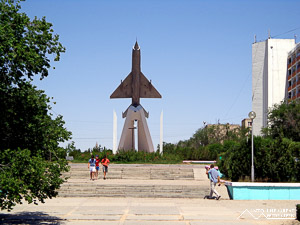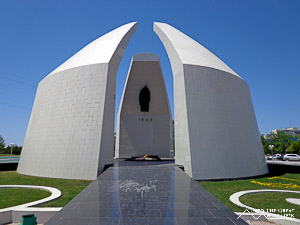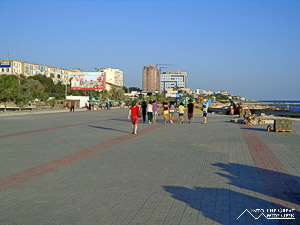Aktau, Kazakhstan
Black Gold
June 14, 2012
So goodbye yellow brick road
Where the dogs of society howl
You can't plant me in your penthouse
I'm going back to my plough
- Elton John

Coming from rural Uzbekistan, Aktau was quite a shock. Within minutes of getting off the train I was in a relatively new car speeding through the steppe landscape towards the city. The relatively new car I was in was being passed by larger and newer SUVs on the smoothly paved road. Entering the center of town, mostly modern gleaming new buildings lined the main avenue while aging Soviet apartment buildings were never far behind. Everything was clean and well maintained and the presence of money was palpable everywhere. There was no better example than the Aktau Center, a new shopping mall complete with an indoor ice skating rink and an outdoor pool with cabanas; there was even a Hollywood Cafe.

All this development comes as a result of oil and gas, a sort of black gold, and companies and the government reap huge profits from its extraction, transport, and consumption. There is a lot involved when you think about the steps needed to bring massive quantities of oil and gas from beneath the sea floor to the surface, process and refine it, and then transport all the way to our homes and cars. The economies of scale are staggering and huge foreign companies compete for the spoils, paying extravagant salaries to expatriates working in Aktau, and often kickbacks to the government officials to secure the lucrative contracts. The expatriates live here on expense accounts, housing allowances, and have private drivers all in conjunction with tax free salaries. The only problem with that in Aktau is that there really isn’t anything to do. This mass of disposable income manifests itself in fancy cars, expensive restaurants and bars, and the usual gluttony of first world consumerism, the very things that I have tried to avoid during this trip. It is such a contrast to the people I shared my train car with. Those locals have significantly lower salaries, live out of the center of Aktau, yet are still left to deal with rising prices and the rising cost of living. There is an increasing amount of inequality as the government lines its pockets with money and caters to the foreign companies that enable it rather than provide for the majority of its citizens.

Less than 24 hours by train from the poorest region of Uzbekistan, literally at the end of the world in the middle of nowhere, Aktau offered more reminders of home than I would have ever thought. In a trip that so far has been marked by new experiences and drastically different cultures and places I was suddenly looking at a daily life that I might have one day after I finish business school. This was a rather unexpected reminder that while money can buy many nice things, it can’t buy the most important things.















































